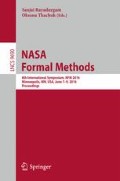Abstract
This paper presents a formal mathematical framework for performance analysis (in terms of success of given tasks) of complex systems, ATLAS. This method interestingly combines temporal aspects (for the description of the complex system) and probabilities (to represent performance). The system’s task to be evaluated is described using a temporal language, the ATLAS language: the architecture of the task is decomposed into elementary functionalities and temporal operators specify their arrangement. Starting with the success probabilities of the elementary functionalities, it is then possible to compute the overall success probability of the task using mathematical formulae which are proven in this paper. The method is illustrated with a deorbitation task for a retired satellite called ENVISAT.
Access this chapter
Tax calculation will be finalised at checkout
Purchases are for personal use only
References
Allen, J.F.: Maintaining knowledge about temporal intervals. Commun. ACM 26(11), 832–843 (1983)
Allen, J.F.: Temporal reasoning and planning. In: Reasoning about Plans, pp. 1–67. Morgan Kaufmann Publishers Inc., San Francisco (1991)
Bertrand, S., Donath, T., Kervarc, R., Lancien, A., Louyot, C., Merit, S., Piernas, A., Prudhomme, S.: Probabilistic performance evaluation of tactical ballistic missile defence architectures. In: 6th International Conference on Missile Defence (2009)
Bertrand, S., Prudhomme, S., Merit, S., Jolly, C., Kervarc, R., Donath, T.: Space systems’ vulnerability assessment to space debris: a methodology and a program. In: 2012 IEEE Aerospace Conference, pp. 1–15. IEEE (2012)
Bobbio, A., Ciancamerla, E., Franceschinis, G., Gaeta, R., Minichino, M., Portinale, L.: Sequential application of heterogeneous models for the safetyanalysis of a control system: a case study. Reliab. Eng. Syst. Saf. 81, 269–280 (2003)
Bonnal, C., Ruault, J.M., Desjean, M.C.: Active debris removal: recent progress and current trends. Acta Astronaut. 85, 51–60 (2013)
Chan, F.K.: Spacecraft Collision Probability. Aerospace Press El Seg., CA (2008)
Chaochen, Z., Hoare, C.A.R., Ravn, A.P.: A calculus of durations. Inf. Process. Lett. 40(5), 269–276 (1991)
Clerc, X., Retat, I.: Astrium vision on space debris removal. In: Proceeding of the 63rd International Astronautical Congress (IAC 2012), vol. 15, Napoli, Italy (2012)
Dhillon, B.S.: Design Reliability: Fundamentals and Applications. CRC Press, Boca Raton (1999)
Dutuit, Y., Châtelet, E., Signoret, J.P., Thomas, P.: Dependability modelling and evaluation by using stochastic petri nets: application to two test cases. Reliab. Eng. Syst. Saf. 55(2), 117–124 (1997)
Hansen, K.M., Ravn, A.P., Stavridou, V.: From safety analysis to software requirements. IEEE Trans. Softw. Eng. 24(7), 573–584 (1998)
Hansen, M.R., Chaochen, Z.: Duration calculus: logical foundations. Formal Aspects Comput. 9(3), 283–330 (1997)
van der Heijden, M., Lucas, P.J.: A probabilistic logic of qualitative time. In: Probabilistic Problem Solving in BioMedicine, p. 69 (2011)
Kang, C., Golay, M.: A bayesian belief network-based advisory system for operational availability focused diagnosis of complex nuclear power systems. Expert Syst. Appl. 17(1), 21–32 (1999)
Kervarc, R., Bertrand, S., Prudhomme, S., Elie, A., Carle, P., Donath, T.: A functional approach to the assessment of debris effect on spatial systems. In: MASCOT&ISGG 2012 (2012)
Kervarc, R., Bourrely, J., Quillien, C.: A generic logical-temporal performance analysis method for complex systems. Math. Comput. Simul. 81, 717–730 (2010)
Lang, T., Kervarc, R., Bertrand, S., Carle, P., Donath, T., Destefanis, R., Grassi, L., Tiboldo, F., Schäfer, F., Kempf, S., et al.: Short and long term efficiencies of debris risk reduction measures: application to a european LEO mission. Adv. Space Res. 55(1), 282–296 (2015)
Morio, J., Piet-Lahanier, H., Poirion, F., Marzat, J., Seren, C., Bertrand, S., Brucy, Q., Kervarc, R., et al.: An overview of probabilistic performance analysis methods for large scale and time-dependent systems. AerospaceLab 3(4), 1 (2012)
Nourelfath, M., Dutuit, Y.: A combined approach to solve the redundancy optimization problem for multi-state systems under repair policies. Reliab. Eng. Syst. Saf. 86(3), 205–213 (2004)
Perez, E.: Vega users manual. ARIANESPACE (3), 154 (2012)
Perez, E.: Soyuz from the guiana space centre users manual. Technical report Arianespace (2012)
Schellhorn, G., Thums, A., Reif, W.: Formal fault tree semantics. In: Proceedings of the 6th World Conference on Integrated Design & Process Technology (2002)
Taylor, J.: Fault tree and cause consequence analysis for control software validation. Technical report (1982)
Vesely, W.E., Goldberg, F.F., Roberts, N.H., Haasl, D.F.: Fault tree handbook. Technical report, DTIC Document (1981)
Author information
Authors and Affiliations
Corresponding author
Editor information
Editors and Affiliations
Rights and permissions
Copyright information
© 2016 Springer International Publishing Switzerland
About this paper
Cite this paper
Piel, A., Bourrely, J., Lala, S., Bertrand, S., Kervarc, R. (2016). Temporal Logic Framework for Performance Analysis of Architectures of Systems. In: Rayadurgam, S., Tkachuk, O. (eds) NASA Formal Methods. NFM 2016. Lecture Notes in Computer Science(), vol 9690. Springer, Cham. https://doi.org/10.1007/978-3-319-40648-0_1
Download citation
DOI: https://doi.org/10.1007/978-3-319-40648-0_1
Published:
Publisher Name: Springer, Cham
Print ISBN: 978-3-319-40647-3
Online ISBN: 978-3-319-40648-0
eBook Packages: Computer ScienceComputer Science (R0)

